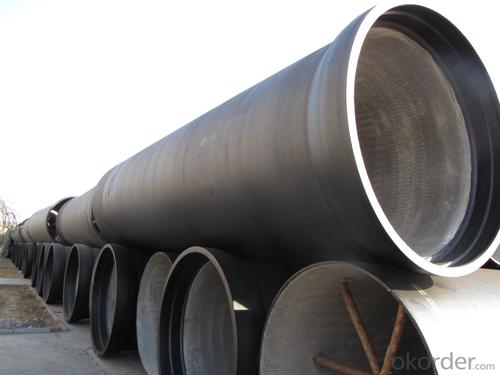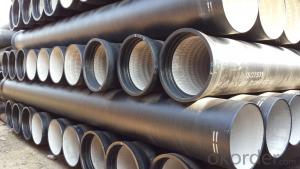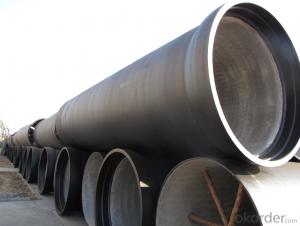Ductile Iron Pipe DN1600
OKorder Service Pledge
Quality Product, Order Online Tracking, Timely Delivery
OKorder Financial Service
Credit Rating, Credit Services, Credit Purchasing
You Might Also Like
Specifications
Quick Details
| Place of Origin: | China (Mainland) | Brand Name: | CMAX | Model Number: | T type / K type / Flange type |
| Length: | 6m / 5.7m / Negotiable | Standard: | ISO2531 / EN545 / EN598 | Application: | Potable / Sewage water |
| Diameter: | DN80~DN2200 | Shape: | Round | Hardness: | 230 |
| Pipe Wall Thickness: | standard | Pull Strength: | 420 | Yield (≥ MPa): | 300 |
| Material: | Ductile Iron | Type: | Centrifugal ductile cast iron pipe | Certification: | ISO2531 / EN545 / EN598 |
| Outer Diameter: | 80-2200 | Thickness: | standard | Specification: | DN80~DN2200 |
| |
The advantages to the customer:
Trustworthy financial strength.
One-stop shopping.
Fast and efficient service.
Coordination of shipments from multiple plants.
Specialists of the overseas shipping process.
A more competitive price.
- Q: What is the internal lining used in ductile iron pipes?
- Ductile iron pipes commonly employ a cement mortar lining as their internal coating. This lining is carefully applied to safeguard the pipe from corrosion and abrasion. By doing so, it effectively prolongs the pipes' lifespan and enables them to endure the demanding conditions of water or sewage transportation. Moreover, this lining enhances the hydraulic efficiency of the pipes by diminishing friction and averting the development of biofilms or deposits on the inner surface. In essence, incorporating a cement mortar lining into ductile iron pipes is crucial for preserving the integrity and functionality of the infrastructure.
- Q: What are ductile iron pipes?
- Ductile iron pipes are a type of iron piping that possess unique properties, making them highly durable and flexible. They are made by adding small amounts of magnesium to cast iron, which transforms the brittle material into a stronger and more malleable form. Due to their high tensile strength and ability to withstand extreme conditions, ductile iron pipes are commonly used in various applications such as water and sewage systems, industrial plants, and transportation infrastructure.
- Q: Principles for the antiseptic treatment of ductile iron pipes
- The principle that the antiseptic treatment of ductile iron pipes must be complied with is that.1. internal and external surface coating shall be kept clean, remove rust and impurities2. after coating on the inside and outside surface, the coating should be even and smooth, firm and firm, and shall not be abnormal because of climate change3. coating for water delivery should be insoluble in water, no peculiar smell, harmful impurities content
- Q: Method for joining cast iron pipes
- The connection between the pipe and the pipe adopts the form of socket type or flange disk interface. According to the function, it can be divided into two kinds: flexible interface and rigid interface. The flexible interface is sealed with rubber ring, which allows a certain degree of corner and displacement, so it has good seismic resistance and tightness. It is easy and quick to install than rigid interface. It has little labor intensity according to the casting method.
- Q: What are the different methods for repairing ductile iron pipe?
- Repairing ductile iron pipes can be done using various methods, which depend on the extent and location of the damage. One popular approach involves the utilization of repair clamps or couplings. These clamps or couplings, typically constructed from stainless steel, are designed to effectively seal off and prevent further leakage from leaks or cracks in the pipe. They can be used as a temporary or permanent solution. Another option is the application of epoxy lining or patching. This method entails the use of a specialized epoxy material that forms a protective barrier on the inside of the pipe, effectively covering the damaged area. It is particularly suitable for smaller cracks or leaks and offers a durable solution. In cases where the damage is more severe, such as the presence of large cracks or fractures, it may be necessary to remove and replace the damaged section of the pipe. This process involves excavating the surrounding area, eliminating the damaged part, and installing a new section of ductile iron pipe. Alternatively, trenchless repair methods can be employed. These advanced techniques, including pipe bursting or cured-in-place pipe lining, allow for pipe repair without extensive excavation. Not only can these methods be more cost-effective, but they also cause less disruption compared to traditional repair approaches. It is important to consider the extent of the damage, the pipe's location, and the available resources and expertise when selecting a specific repair method for ductile iron pipes. Seeking guidance from a professional pipe repair service is advised to determine the most appropriate approach for a particular repair situation.
- Q: How does ductile iron pipe perform in areas with high groundwater salinity?
- Ductile iron pipe performs well in areas with high groundwater salinity due to its corrosion resistance properties. The iron pipe is coated with a protective layer that prevents corrosion and extends its lifespan, even in saline environments.
- Q: How is ductile iron pipe recycled?
- Ductile iron pipe is typically recycled through a process called reclamation. This involves collecting the used pipe, cleaning and removing any impurities, and then melting it down to form new ductile iron products. The recycled ductile iron can be used to manufacture various items such as new pipes, fittings, and construction materials, providing a sustainable and environmentally-friendly solution for its disposal.
- Q: Can ductile iron pipes be used for underground wastewater outfalls?
- Ductile iron pipes are able to be utilized for underground wastewater outfalls. These pipes are favored for underground applications due to their robustness, sturdiness, and resistance to corrosion. They are specifically designed to endure high pressure and external loads, thereby making them suitable for the transportation of wastewater across long distances and depths. Moreover, ductile iron pipes possess a smooth internal surface, which aids in reducing friction and preventing the accumulation of sediments or debris that might obstruct the flow of wastewater. Consequently, ductile iron pipes are widely employed in underground wastewater systems, including outfalls, in order to ensure efficient and dependable wastewater conveyance while minimizing the likelihood of pipe failure or blockages.
- Q: What is the typical weight of ductile iron pipes?
- The typical weight of ductile iron pipes can vary depending on their size and thickness. However, as a general guideline, ductile iron pipes commonly range in weight from around 1 pound per foot for smaller diameter pipes to several hundred pounds per foot for larger diameter pipes. The weight of ductile iron pipes is determined by factors such as the pipe's dimensions, the thickness of its walls, and the specific requirements of the intended application. It is important to note that these weights are approximate and can vary based on the specific manufacturer and product specifications.
- Q: What is the difference between a PE fire hose and a ductile iron pipe?
- Galvanized steel pipe: divided into cold galvanized steel pipe, hot galvanized steel pipe, cold galvanized steel pipe has been banned, and the latter is also advocated by the state for the time being. In 60s and 70s, developed countries began to develop new types of pipes, and galvanized pipes were banned. China's Ministry of construction and other four ministries also issued a civilization, indeed from two, 000 years since the galvanized pipe as a water supply pipe, the New District cold water pipe has rarely used galvanized pipe, and some of the hot water pipe is galvanized pipe. Hot dip galvanized steel pipe is widely used in fire, power and highway.
Send your message to us
Ductile Iron Pipe DN1600
OKorder Service Pledge
Quality Product, Order Online Tracking, Timely Delivery
OKorder Financial Service
Credit Rating, Credit Services, Credit Purchasing
Similar products
Hot products
Hot Searches
Related keywords
























